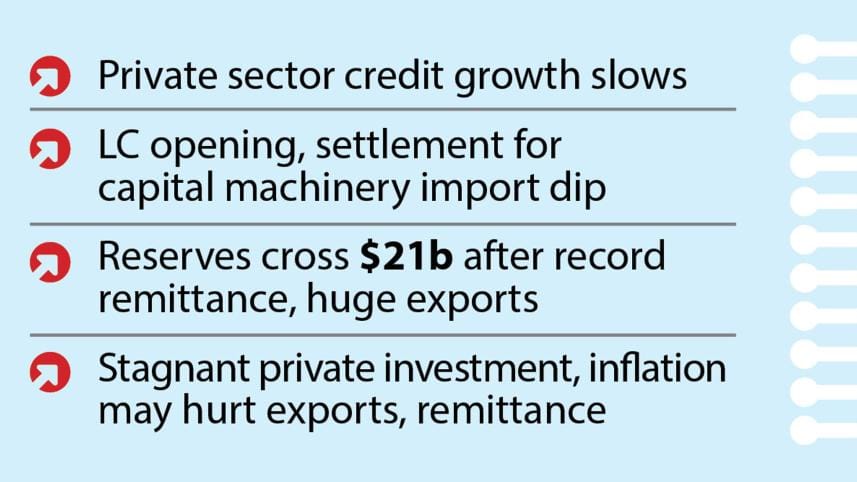Private sector investment remains sluggish

Foreign exchange reserves are showing encouraging signs of stability due to record remittance inflows and rising exports, but private sector investment remains a concern for the government.
Economists attribute this sluggish investment to ongoing political uncertainty and increasing business costs, predicting this trend may persist for another year.
While the central bank's forex management policy is expected to stabilise exports and remittances, sustained improvement hinges on boosting private sector investment and controlling inflation.
Key indicators of private sector investment include private sector credit and capital machinery imports.
Latest data published by the Bangladesh Bank on Thursday showed private sector credit grew 9.86 percent year-on-year in August and then 7.66 percent in November last year.
It fell by 9.20 percent in September and 8.30 percent in October. The private sector credit growth target in the central bank's monetary policy of July was 9.8 percent for December.
During the July-November period of the ongoing fiscal year, letter of credit (LC) settlement for capital machinery import declined by 21.90 percent, compared with that of the same period of the previous fiscal year.
During this period, LC opening for capital machinery import dipped by 26.45 percent, according to central bank data.
Import of intermediate goods also decreased by 15.38 percent and LC opening for these goods saw an 11.52 percent decline.
Zahid Hussain, former lead economist of the World Bank's Dhaka office, identified political uncertainty as one of the main reasons behind such a lack of activity in private investment.
"To what direction the country's politics will be headed is likely to be determined this year. In this context, 2025 is a critical year," he said.
Hussain said there are discussions about the interim government's reform initiatives. Meanwhile, students, along with different political parties, have emerged as a force in the country's politics.
However, there is uncertainty regarding the nature of the future political government and how it will maintain checks and balances, he said.
Businesspersons are unlikely to make new investment decisions until these issues are resolved, he added.
Hussain also said many argue that high interest rates are a factor affecting private investment.
"However, even when interest rates were low, private investment didn't pick up significantly. So, it's difficult to point this out as a reason behind sluggish investment," he said.
Hussain further said liquidity shortage in the banks and the distressed banking system could be blamed for the lack of private investment.
Prof Selim Raihan, executive director of South Asian Network on Economic Modeling (Sanem), also said slow private investment can be attributed to political uncertainty.
He said private investment has been low for the past few years, but the political changeover and uncertainty came as additional challenges. "This situation is not favourable for fresh investment," he said.
Prof Raihan said many businesspersons, who maintained close relations with the previous government, have either ceased operations or are going through a difficult situation after the fall of the Awami League regime.
This has also impacted fresh investment that they would have made for business expansion, he said.
The cost of business increased because of continued high inflation and interest rates, Prof Raihan said. Investors, especially small and medium-sized entrepreneurs, are finding it difficult to take loans from banks and invest, he said.
"So, they are not making any investments at this moment and might have adopted a wait-and-see policy," he added.
He also said it is crucial for the government to prioritise controlling inflation and removing the barriers to "doing business" in the private sector as much as possible.
Prof Raihan was a member of the white paper panel, formed by the interim government, to produce a report on the state of the country's economy.
He said that during their work on the white paper, many local and foreign businessmen informed them that the National Board of Revenue and Bangladesh Bank, through their rules and regulations, created obstacles to investment.
WILL RESERVES REMAIN STABLE?
The country's forex reserves have crossed $21 billion for the first time since the interim government took charge in August. The reserves stood at $21.36 billion on December 31.
It was possible mainly because of high remittance inflow, as Bangladeshis abroad broke previous records by sending $26.9 billion last year -- a 23 percent year-on-year rise.
Monthly remittance inflow rose to a record $2.63 billion in December, up 33 percent from a year earlier.
Bangladesh's exports also hit $50 billion in 2024, an 8.3 percent year-on-year increase.
In December alone, exporters earned $4.62 billion, an 18 percent increase compared to the same month in the previous year.
Development partners, including the World Bank and Asian Development Bank, provided more than $1 billion in budget support in December, contributing to the boost in forex reserves.
Zahid Hussain said uncertainty over reserve management is going away because of the central bank's current foreign currency policy.
As a result, a kind of stability might return to the country's macroeconomy, especially the external sector, he said.
Hussain said the overseas laundering of money, especially funds earned through corruption, stopped after the interim government took charge.
Besides, because of stable exchange rates, both forex reserves and remittance inflow have increased, and such growth could be a new normal, he said.
Prof Raihan said remittance and export earnings are promising signs for the country's economy. However, such growth will not continue if the country's private investment does not improve and the government fails to control inflation.




 For all latest news, follow The Daily Star's Google News channel.
For all latest news, follow The Daily Star's Google News channel.
Comments